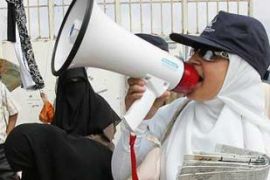Morocco set for landmark poll
Moroccans prepare to vote to elect new 325-seat House of Representatives.

|
“While none of the parties questions the monarchy, some left-wing ones seek reforms“ |
The election for the House of Representatives – including 30 reserved for women – is by proportional representation.
The electoral system allows none of the 33 competing parties to get a ruling majority, and no mainstream party wants to link up with the PJD.
At the last election in 2002, the PJD won 42 seats but was kept out of the governing coalition which was led by Driss Jettou, then a non-politician chosen by the king to head a five-party coalition including the Union of Socialist Popular Forces (USFP) and the nationalist Istiqlal party.
Ahmed El Amraoui, Al Jazeera’s correspondent in Rabat, said: “The PJD enjoys broad popularity among the poor in many of the country’s marginalised communities.
“However, since Morocco’s political landscape is marked by such diversity, it is unlikely that a single party will win an outright majority.”
Islamist pledge
Othmani, a 51-year-old psychiatrist, has promised “more seriousness, more honesty and more transparency” if he becomes prime minister.
| Morocco votes |
But analysts say this is highly unlikely as Mohammed VI is more likely to pick someone from whichever coalition is assembled, or another technocrat like Jettou.
Ahead of the poll, Othmani took pains to reassure Morocco’s foreign allies by telling the French weekly magazine Pelerin: “I’m a Muslim Democrat just as others in Europe are Christian Democrats.”
“Modernity is not contradictory with a Muslim identity,” he said.
While none of the parties questions the monarchy, where most power is concentrated, some left-wing ones seek constitutional reforms.
Three allied extreme left-wing groups have made such reforms the centrepiece of their election programmes.
Turnout fears
A record 6,691 candidates are competing for seats, but the turnout, which slid from 67 per cent in 1984 to 52 per cent in 2002, and how the vote is conducted, will be key tests of credibility in the election.
Al Amraoui says the authorities anticipate that only about half of the three million new people eligible to vote since the last election have registered, reflecting young people’s lack of confidence in the elections.
As a result, the government has adopted new technological methods to encourage voter registration and set up a special internet site, where citizens can find answers to common questions about the registration and voting process.
The ministry of the interior also allowed voters to register by sending their national ID card number and date of birth by SMS to a toll-free phone number.
“A strong turnout would give legitimacy to the poll and all of the policies carried out by the authorities since 2002,” said Mohamed Darif, a professor of political science at Mohammedia University. “These are the real stakes.”
King Mohammed VI voiced his concerns in an August 20 speech when he called on all parties to encourage people to vote. He also called on the judiciary to “fight all forms of fraud”.
For the first time in modern Moroccan history, an international group of 43 multi-national observers has been granted the right to monitor the elections under the supervision of the United States’ National Democratic Institute.
Results are due on September 9.